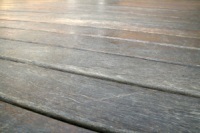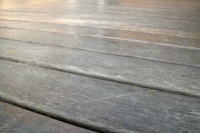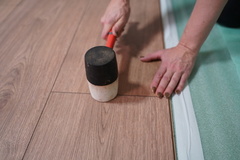Exotic hardwood deck gives homeowner trouble
Updated: 2020-12-16

Q: Eighteen months ago I had a contractor build a wraparound deck of about 1,000 square feet with three separate levels and three sets of steps. I decided to have the deck built with the Brazilian hardwood ipe after viewing some of the decks he had built using this wood. They were beautiful. My new deck looked so good that I asked him to build a new fence adjoining the deck using the ipe wood. When the construction of the deck and fence was complete he sanded them and then stained them with a stain made specifically for that kind of wood. The results were spectacular.
But, after the first rain, about two months later, the stain was completely gone from the deck except for a small area under the roof overhang. The contractor brought his crew back and they re-sanded the deck (not the fence) and stained it again using the same stain.
Within another three months, the stain was gone from all the flat surfaces of the deck again. This time there was no rain, but the sun hit the deck a good portion of the day. This poor contractor was beside himself. He again brought his crew back and this time they re-sanded the deck and stained it with Penefin, which is supposed to be made specifically for this kind of wood. Within three months, with no rain, the wood was back to its natural state. The vertical fencing, which is mostly in the shade, has not had this problem and is very rich looking.
Last week I had a contractor who specializes in cleaning and treating decks come to my house to see if he could do better. He told me it is not the contractor's fault because the wood is so dense that nothing will penetrate it. Both Cabot and Penefin (both wood stain companies) say they have no service representatives who will come to my home to see what is going on. Can you offer any suggestions or solutions to this problem?
A: Ipe is also known as Ironwood. It's gorgeous, rot-resistant, pest-resistant, extremely strong and extremely dense. The characteristics that make it long lasting, its strength and density, also make it a tough candidate for holding a finish that will maintain an unweathered look.
Most deck stains are really penetrating sealers. They are designed to penetrate the fibers of the wood and protect against ultraviolet light, which causes weathering and color change. Ipe is so dense that most stains cannot penetrate it. They simply dry on the surface of the wood and are at the mercy of the sun and the rain.
You are right when you say your contractor is not at fault. We've reviewed some of the technical literature available on the Internet and found recommendations that ipe be treated with penetrating stains and oils. Clearly, this did not work for you.
These sites tout the rot- and pest-resistant qualities of ipe, claim it is relatively maintenance-free and suggest that it be allowed to weather naturally to a silver gray. Almost as an afterthought they suggest "sealing" it with tung oil or a penetrating stain.
Recently we attended the annual Pacific Coast Builder's Conference. Kevin brought your question up in an extensive interview he did with Jennifer Haney of Duckback Products. The people at Duckback, based in Chico, Calif., have been making deck treatments for more than 20 years. Bill has used their Superdeck product on a redwood deck he built and finished and was very pleased with its performance.
According to Duckback, they have recently developed a new product specifically for exotic hardwoods. Superdeck Exotic Hardwood Finish and Sealer is a water-based urethane coating (not a penetrating stain) containing finely ground transparent iron oxide pigments that they claim prevents wood from graying and fading.
Some color is necessary to provide protection from ultraviolet light, the culprit in aging wood. According to Haney, this product has performed admirably for more than 3,000 hours in a laboratory weather simulation.
We think this approach makes sense. As you've seen, the density of ipe makes it inhospitable for a penetrating stain. A surface sealer may well be the right approach. We think it's worth investigating.
But, after the first rain, about two months later, the stain was completely gone from the deck except for a small area under the roof overhang. The contractor brought his crew back and they re-sanded the deck (not the fence) and stained it again using the same stain.
Within another three months, the stain was gone from all the flat surfaces of the deck again. This time there was no rain, but the sun hit the deck a good portion of the day. This poor contractor was beside himself. He again brought his crew back and this time they re-sanded the deck and stained it with Penefin, which is supposed to be made specifically for this kind of wood. Within three months, with no rain, the wood was back to its natural state. The vertical fencing, which is mostly in the shade, has not had this problem and is very rich looking.
Last week I had a contractor who specializes in cleaning and treating decks come to my house to see if he could do better. He told me it is not the contractor's fault because the wood is so dense that nothing will penetrate it. Both Cabot and Penefin (both wood stain companies) say they have no service representatives who will come to my home to see what is going on. Can you offer any suggestions or solutions to this problem?
A: Ipe is also known as Ironwood. It's gorgeous, rot-resistant, pest-resistant, extremely strong and extremely dense. The characteristics that make it long lasting, its strength and density, also make it a tough candidate for holding a finish that will maintain an unweathered look.
Most deck stains are really penetrating sealers. They are designed to penetrate the fibers of the wood and protect against ultraviolet light, which causes weathering and color change. Ipe is so dense that most stains cannot penetrate it. They simply dry on the surface of the wood and are at the mercy of the sun and the rain.
You are right when you say your contractor is not at fault. We've reviewed some of the technical literature available on the Internet and found recommendations that ipe be treated with penetrating stains and oils. Clearly, this did not work for you.
These sites tout the rot- and pest-resistant qualities of ipe, claim it is relatively maintenance-free and suggest that it be allowed to weather naturally to a silver gray. Almost as an afterthought they suggest "sealing" it with tung oil or a penetrating stain.
Recently we attended the annual Pacific Coast Builder's Conference. Kevin brought your question up in an extensive interview he did with Jennifer Haney of Duckback Products. The people at Duckback, based in Chico, Calif., have been making deck treatments for more than 20 years. Bill has used their Superdeck product on a redwood deck he built and finished and was very pleased with its performance.
According to Duckback, they have recently developed a new product specifically for exotic hardwoods. Superdeck Exotic Hardwood Finish and Sealer is a water-based urethane coating (not a penetrating stain) containing finely ground transparent iron oxide pigments that they claim prevents wood from graying and fading.
Some color is necessary to provide protection from ultraviolet light, the culprit in aging wood. According to Haney, this product has performed admirably for more than 3,000 hours in a laboratory weather simulation.
We think this approach makes sense. As you've seen, the density of ipe makes it inhospitable for a penetrating stain. A surface sealer may well be the right approach. We think it's worth investigating.
For more similar articles, please visit Wood
Comments (0)


